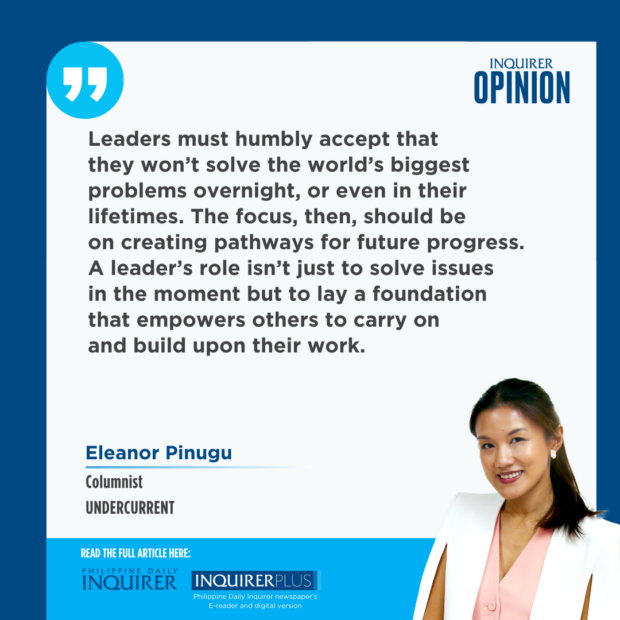Insights from former president Obama

In 2019, I had the remarkable experience of meeting former president Barack Obama. I was one of the 200 leaders chosen for the inaugural cohort of the Obama Asia-Pacific Leaders—a yearlong leadership development program which commenced with a five-day convening in Malaysia attended by Mr. Obama and former first lady Michelle Obama.
The closing session was an “Ask me Anything” format with Mr. Obama. And one participant asked him a question that kept coming up throughout the week: What do you do when you feel like you’ve hit a wall and are constantly losing the battle? This sentiment strongly resonated with me. At the time, I had already been working in the nonprofit sector for 11 years—way past the honeymoon stage—and was having a difficult time sustaining the enthusiasm I had at the start. As it turned out, many of the older participants working in the development and public sector felt the same way. The more we understand the scale of the issues we are trying to address, the more our impact feels miniscule, and the more tempting it feels to question whether our efforts can truly make a difference.
Mr. Obama’s advice focused on three key things: perspective, incremental wins, and mechanisms for enduring change.
Broaden your perspective through historical context. Obama encouraged leaders to view their struggles within the broader sweep of history, reminding them that humanity has endured “really bad times” yet constantly moved forward, however slowly. Setbacks, he said, are inevitable, but the trajectory is always positive. True leadership then is about having the resilience to stay for the “long haul” and the humility to learn from these challenges.
Embrace incremental wins. Mr. Obama also highlighted a necessary, but often unwelcome aspect of leadership: the willingness to be “practical about looking where you can take some wins.” He stressed that real-world problems are far too complex to be solved entirely or instantaneously and young leaders who always expect big highs are often setting themselves up for disillusionment. He argues that striving for “100 percent” is unrealistic, as complex issues have many opposing forces and interests at play. Instead, leaders should measure progress by asking, “Will this make things better?” If the answer is yes, then those small victories are worth pursuing. Embracing this philosophy that “better is good” helps leaders stay committed to their mission, understanding that enduring change builds through accumulated, manageable steps.
Build mechanisms for enduring change. Mr. Obama further emphasized that change isn’t usually achieved by a single, sweeping act. Instead, it requires creating systems that move society gradually toward improvement. Reflecting on his efforts to encourage clean energy investment, he describes taking satisfaction from establishing mechanisms—policies and standards that helped signal to businesses the importance of sustainable practices. Leaders must humbly accept that they won’t solve the world’s biggest problems overnight, or even in their lifetimes. The focus, then, should be on creating pathways for future progress. A leader’s role isn’t just to solve issues in the moment but to lay a foundation that empowers others to carry on and build upon their work. Last week, I was reminded of these insights, after seeing many people voice their disappointment and disillusionment with the victory of President-elect Donald Trump in the recent United States elections. The exit polls showed his support had significantly expanded across nearly every demographic, especially among Latino voters. Online, many responded with vitriol, venting anger at minority groups. Disturbingly, some even suggested finding ways to deport these migrant citizens—echoing the same “Make America Great Again” hateful rhetoric that liberals once vowed to stand against. Yet, in a joint statement following Trump’s reelection, the Obamas sought to remind the US public that despite their differences, principles like inclusivity, compassion, and shared progress remain worth defending. “In a country as big and diverse as ours, we won’t always see eye-to-eye on everything,” they said. “But progress requires us to extend good faith and grace—even to people with whom we deeply disagree. That’s how we’ve come this far, and it’s how we’ll keep building a country that is more fair and more just, more equal and more free.”
My personal encounter with Mr. Obama took place during a community immersion session, where we were tasked to assemble classroom chairs and tables for Malaysian public schools. When he stopped by my group’s station, I asked him what he was looking forward to in the future. His work now, he said, lay in “passing the baton” and helping guide a new generation of leaders. As the Democratic Party faces an essential moment of introspection from their defeat, that mission seems more daunting and especially urgent.
—————-
eleanor@shetalksasia.com




















